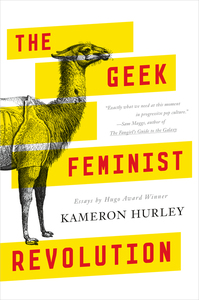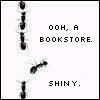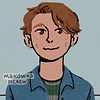Take a photo of a barcode or cover
I finished this collection on the plane to SDCC and had a quiet moment of overwhelming feelings on the plane. Where this book really worked for me is in the last set of essays in the Revolution category. Almost every essay in the first half left me wanting more analysis or discussion of the topic. It felt like snippets of ideas that weren't completed. That changed entirely in the last section and I'm eager to sit down with them again and scribble my notes in the margins. In particular, the last essay ("We Have Always Fought", the most widely known one in the book perhaps) ends on a strong note. At the very least, I am encouraging my friends to find an online version of that essay and read it.
This is a must read for any SFF writer. There's a lot of good thoughts in here and it definitely puts the reality of being a female content creator to good words, but it's mostly autobiographical which really didn't mean much to me since I've never read anything of Kameron Hurley's work beforehand so many of her self-references were lost on me. But again, there's a lot of great thoughts and beneficial information for SFF authors. The effort to be intersectional was very clear and I appreciated it.
I first encountered Kameron Hurley through the piece "We Have Always Fought" (included in this collection) which resonated with me because of my background as a historian. Thinking about how we perceive and understand women's roles in the past has strong throughlines to how we write and understand female roles in fantasy writing. It's a magnificent essay one that everyone should read.
That aside, the rest of this collection essays provides insight into Kameron Hurley's creative process and experience. It's poignant, honest, and well worth reading.
A few quotations:
"I have the power to reach back to you long after I am dead, through these spidery marks on paper or pixels, and remind you that you have a voice, you have agency, and your voice is stronger and more powerful than you could ever imagine, and long after I am gone, you can pick up this beer beside me and carry on the work we are doing now, the work we have always been doing, the work we will always do, until the world looks the way we imagine it can be."
"Stories teach us empathy, and limiting the expression of humanity in our heroes entirely based on sex or gender does us all a disservice. It places restrictions on what we consider human, which dehumanizes the people we see who to not express traits that fit our narrow definition of what’s acceptable. Like it"
"The fastest way to dehumanize a person, or a subset of people, is to make them invisible. To lock them away. To say, “This is the stuff of circuses and mistakes. This is the stuff of nightmares.”"
"So if you find yourself wondering why so many of us ask to be included now, and put ourselves and others into stories we’ve been written out of, perhaps first ask why that inclusion is considered political, but the erasure was not: the laws, the asylums, the housing policies, the repression, the abuse. There is nothing more political than erasure. Than unseeing. The world is not changing. It’s been this way all along. We have been here all along. All that’s changing is what you see. You just never saw us. I never saw us."
That aside, the rest of this collection essays provides insight into Kameron Hurley's creative process and experience. It's poignant, honest, and well worth reading.
A few quotations:
Spoiler
"I have the power to reach back to you long after I am dead, through these spidery marks on paper or pixels, and remind you that you have a voice, you have agency, and your voice is stronger and more powerful than you could ever imagine, and long after I am gone, you can pick up this beer beside me and carry on the work we are doing now, the work we have always been doing, the work we will always do, until the world looks the way we imagine it can be."
"Stories teach us empathy, and limiting the expression of humanity in our heroes entirely based on sex or gender does us all a disservice. It places restrictions on what we consider human, which dehumanizes the people we see who to not express traits that fit our narrow definition of what’s acceptable. Like it"
"The fastest way to dehumanize a person, or a subset of people, is to make them invisible. To lock them away. To say, “This is the stuff of circuses and mistakes. This is the stuff of nightmares.”"
"So if you find yourself wondering why so many of us ask to be included now, and put ourselves and others into stories we’ve been written out of, perhaps first ask why that inclusion is considered political, but the erasure was not: the laws, the asylums, the housing policies, the repression, the abuse. There is nothing more political than erasure. Than unseeing. The world is not changing. It’s been this way all along. We have been here all along. All that’s changing is what you see. You just never saw us. I never saw us."
I wish I'd read the reviews first. I expected this to be about feminism (and the need for it) in geek culture as a whole. What I got was a how-to guide for being a feminist scifi/fantasy author. It was still an informative read and it did give me some really important concepts to examine, but not being an aspiring writer, I'm not the target audience. While I'm disappointed by the misleading title and description, I do appreciate the overall message of inclusion and the importance of actively correcting our own problematic thinking/seeing/speaking/writing.
This is absolutely amazing and wonderful, has countless important quotes within, and I only wish I'd read this much, much sooner.
I'm all for feminism and I love that this book gives you new perspectives on things. It kind of opens your eyes to things you probably didn't really think about when watching or reading it. This book analyzes a lot of the stuff in media and pop culture, and a lot of the feminist views on things such as Die Hard, Buffy, and Mad Max...etc, it definitely shed light on things I didn't really think about before. At the same time however, I felt like it was too hardcore with the feminist thoughts and a bit intense at times. I think that it what kind of turned me off from really loving this book, otherwise I loved the thoughts and new ways to look at things.
I have never read any of Kameron Hurley's other essays or science fiction novels, nor have I watched or read many of the works she references. I still greatly enjoyed the essays in this book and had no trouble following her train of thought. This is a fast and interesting read that I would definitely recommend to anyone interested in the relationship between feminism and media, particularly so far as the experiences of those who create media are concerned.
So on the general points being made I am in agreement with the author. However, while it wasn't the worst book, overall I did not enjoy it. I feel that what she is saying isn't really adding to feminist scholarship, media studies, or an understanding of geek culture. Part of my dislike may be because I listen to this on an audiobook, which I wouldn't recommend. The reader read the whole book in that 1/2 impassioned, 1/2 yelling rhetoric voice of a political speech. It's fine for 5 minutes, but 8 hours of that energy is tiring. Plus she over-pronounced Ts in a very intentional way that sounds pretentious. Maybe if I read the book it would be better.
As far as content, Hurley repeated herself a lot, throwing in slight changes to the same sentence. There is a lot of discussion of her books, which hey, I'm all for self-promotion but it came across at times as "my books are awesome and these other books suck". It was hit or miss on the essays I liked and didn't. Some were great and others were all over the place. Overall I felt they could have used another edit to tighten and focus them. In several essays, she is talking about the essay as a post which makes it pretty clear it came right from her blog and I wish she would have crafted it a bit more. One wants to feel like they are getting higher quality content in a book than on a blog.
Also, maybe there was a footnote about the spoons she kept talking about, but there was nothing in the audiobook. Not being American or with a chronic illness I had no idea what she was going on about. In general don't make people google your obscure reference in a non-fiction book.
Then there was the swearing. Even for a book that told me in the subheading there would be swearing, there was a lot of swearing. I adore a well-placed fuck or bullshit to make a sentence pop. You can convey power and emotion with profanity, but I saw little tactical application of her profanity. It just felt like a lazy try at being edgy. The older I get the more I see swearing as just a lack of vocabulary.
Lastly, I was turned off by the overall tone of "I'm right and if you don't agree you are wrong" with some of the art critiques she makes. There are some things that are black and white and others that are not, art is one of the later. When you are talking about art there is no one way to experience it and there can be other interpretations of books and movies that are just as valid, but Hurley will brook no arguments.
I think I am more judgmental because I've read great contemporary feminist books like Excluded: Making Feminist and Queer Movements More Inclusive by Julia Serano, Bad Feminist by Roxane Gay, and My New Gender Workbook: A Step-by-Step Guide to Achieving World Peace Through Gender Anarchy and Sex Positivity by Kate Bornstein. I know we can have powerful conversations about gender, culture, and intersectionality with humour, skill, and polish. This just wasn't of the same calibre.
As far as content, Hurley repeated herself a lot, throwing in slight changes to the same sentence. There is a lot of discussion of her books, which hey, I'm all for self-promotion but it came across at times as "my books are awesome and these other books suck". It was hit or miss on the essays I liked and didn't. Some were great and others were all over the place. Overall I felt they could have used another edit to tighten and focus them. In several essays, she is talking about the essay as a post which makes it pretty clear it came right from her blog and I wish she would have crafted it a bit more. One wants to feel like they are getting higher quality content in a book than on a blog.
Also, maybe there was a footnote about the spoons she kept talking about, but there was nothing in the audiobook. Not being American or with a chronic illness I had no idea what she was going on about. In general don't make people google your obscure reference in a non-fiction book.
Then there was the swearing. Even for a book that told me in the subheading there would be swearing, there was a lot of swearing. I adore a well-placed fuck or bullshit to make a sentence pop. You can convey power and emotion with profanity, but I saw little tactical application of her profanity. It just felt like a lazy try at being edgy. The older I get the more I see swearing as just a lack of vocabulary.
Lastly, I was turned off by the overall tone of "I'm right and if you don't agree you are wrong" with some of the art critiques she makes. There are some things that are black and white and others that are not, art is one of the later. When you are talking about art there is no one way to experience it and there can be other interpretations of books and movies that are just as valid, but Hurley will brook no arguments.
I think I am more judgmental because I've read great contemporary feminist books like Excluded: Making Feminist and Queer Movements More Inclusive by Julia Serano, Bad Feminist by Roxane Gay, and My New Gender Workbook: A Step-by-Step Guide to Achieving World Peace Through Gender Anarchy and Sex Positivity by Kate Bornstein. I know we can have powerful conversations about gender, culture, and intersectionality with humour, skill, and polish. This just wasn't of the same calibre.
informative
reflective
medium-paced







